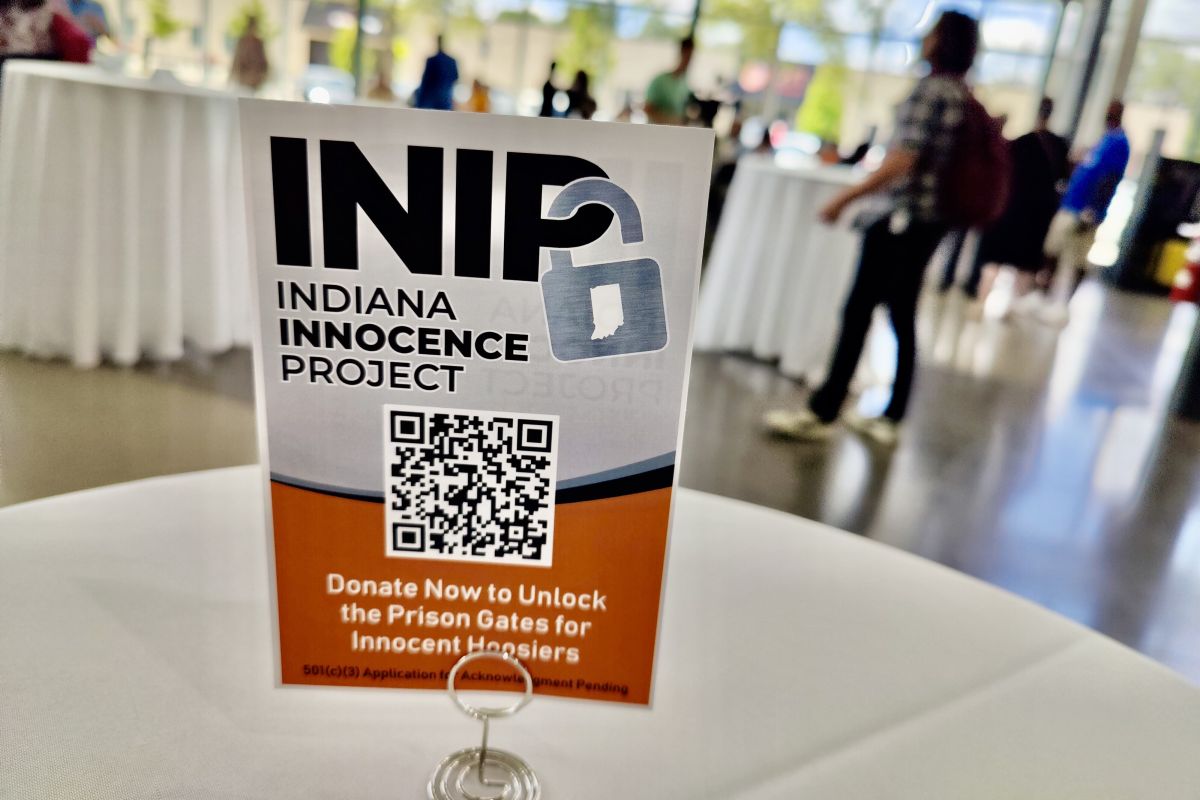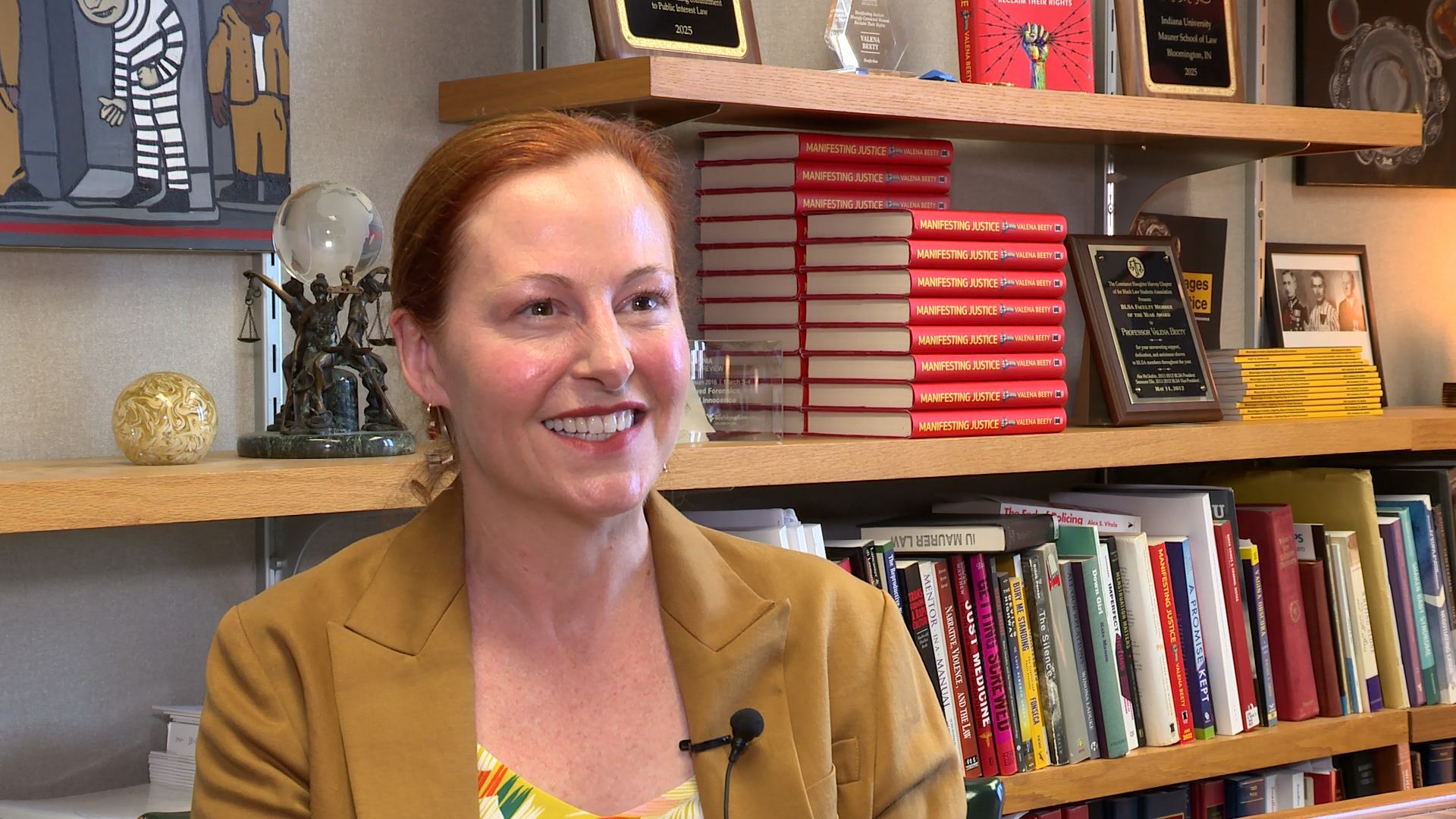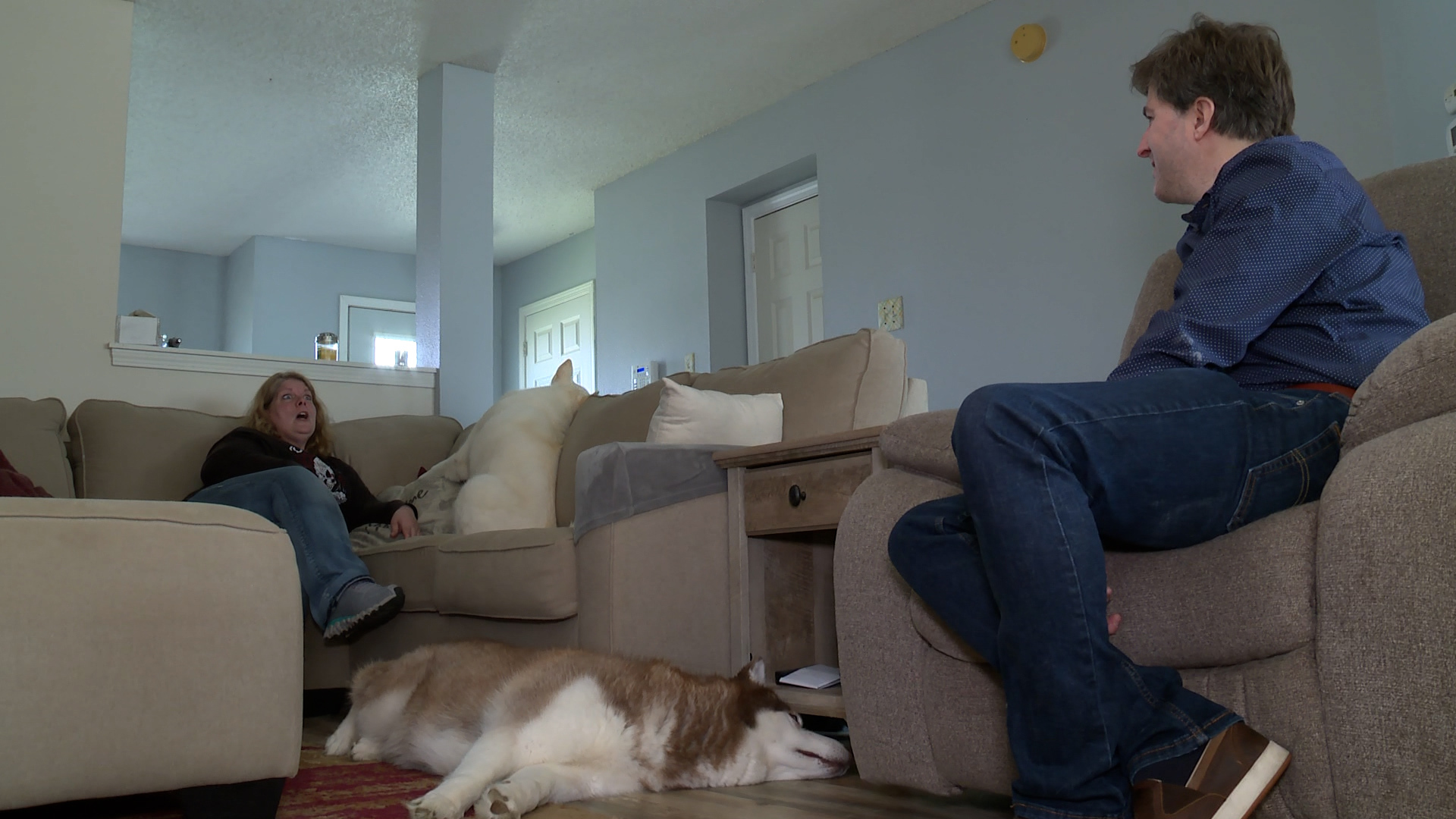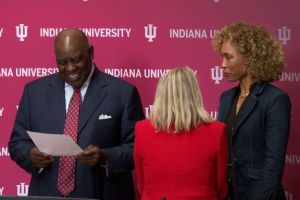
The Indiana Innocence Project launched in August. (George Hale, WFIU/WTIU News)
The Indiana Innocence Project is taking on clients, assisting in appeals and hiring staff a year after the initiative formally launched last summer.
And IU-Bloomington students and faculty are a big part of the operation.
Read more: Indiana Innocence Project officially launches at Indianapolis event
“A key priority of the Indiana Innocence Project is collaborating and working with academic institutions across the state,” said founding board member Valena Beety, a professor at the Maurer School of Law in Bloomington.
Beety, a former Washington, D.C., federal prosecutor and innocence litigator in Mississippi and West Virginia, joined the Maurer school in 2023.
She's now supervising law students on potential innocence cases in Indiana, including one of a prisoner named John Turner, convicted of robbery in 2008 based on eyewitness identification.
“There's a lot that we know about eyewitness identification and misidentification as well as about facial recognition technology now that we did not know back in the late aughts,” Beety said in an interview. “There's not nearly the information that we have now.”
Beety, along with three Maurer students, drafted an amicus brief compiling newly discovered evidence and scientific advancements casting doubt on facial recognition and eyewitness evidence used to convict Turner of robbery and other felonies.
“John Turner should be granted post-conviction relief based on ineffective assistance of counsel for failing to present an expert witness on facial recognition and underlying eyewitness identification issues that would have changed the outcome of his trial, and based on modern scientific advances that would probably produce a different result at retrial,” the brief said.
Last month, Governor Mike Braun signed into law the state’s first witness identification reform bill. Among other changes, it requires law enforcement to inform witnesses that a person accused of a crime might not appear in a lineup.
Beety said she hopes the work that students are doing on cases such as Turner's follows them into their careers in the criminal legal system.
“To learn how to be better prosecutors, learn how to be better public defenders. Or if they want to be a judge, learn how to keep the issues in their minds, while tangibly helping someone who has been wrongfully convicted,” she said.

IU students are also helping to build and operate the project’s intake system, where prisoners or their loved ones can apply for representation.
About 75 cases have been submitted since August, according to Mackenzie Lewis, a 2023 IU graduate who designed the intake system.
“A lot of the times, family or friends will fill out the application on behalf of the incarcerated individual because obviously they don't have a lot of internet access, if any,” Lewis said. “And then we also have a physical application. If someone writes in a letter, I'll send them a copy of our physical application in the mail.”
The application asks a series of questions including information about the crime for which they were convicted, their sentence, and if they have co-defendants.
And, most importantly, if they’re claiming actual innocence: “That’s because some of these cases are people who were genuinely wrongfully convicted but are not actually innocent. So, that’s something we’re interested in knowing.”
Read more: Indiana pays restitution to wrongfully incarcerated
Lewis said her work as an undergraduate and post-graduate helped guide her decision to go to law school in the fall at Boston University.
“It's been an incredible experience,” Lewis said.
“Getting students involved and getting people who maybe aren't super experienced involved and showing them the ropes, I really appreciate that.”
IU Department of Criminology and Criminal Justice faculty member Marla Sandys is supervising Lewis and current criminology students contributing to the project.
“I'm really looking for students who are not just interested, but really committed to this particular issue,” Sandys says.
Sandys, who teaches a popular undergraduate course on the death penalty, consulted with retired professor Fran Watson, who ran a clinic for wrongful conviction claims at the IU McKinney School of Law in Indianapolis, on how to collect and organize important case data.
Read more: Concerns raised over 'actually innocent'
Watson is now president of the Indiana Innocence Project; Sandys is its secretary.
“She was really interested in responding to those people quickly with an initial response and determining where they were procedurally,” Sandys said, and that helped guide her students in developing the system.
“Whether or not people were filing their PCRs (post-conviction review) in a timely manner or if that was an issue,” Sandys said. “We found that it was an issue that they weren't getting their PCR applications in in time, in a lot of the cases.”
Sandys is supervising five students and as the project grows, she hopes to continue bringing in students from IU and other institutions.
She is also training volunteers to review materials received through the system Lewis designed.
“We'll always have multiple people reviewing so that we can have redundancy and make sure that we're getting a variety of different perspectives,” Sandys says. “When we’re doing the trainings, everybody's like, ’It's not going to be just me, is it?’ And we're like, ‘No, no. That's why we're going to have multiple people.’”
Sandys and others involved in getting the project off the ground said the project benefited from including students and faculty from more than one academic discipline.
“No disrespect to legal training but they have a different way of looking at things,” Sandys said. “Having those varied perspectives has been really helpful.”
Cases flagged for legal review by the volunteers eventually reach legal counsel Joshua Barnett, one of the Indiana Innocence Project’s first hires.
Barnett, who started in January, is representing the project’s first two clients and reviewing massive amounts of material related to their cases.
“My day-to-day is reading, honestly,” Barnett says, pointing to a binder of thousands of pages of court transcripts in his temporary home office. “I couldn't tell you every constitutional violation without spending a lot of time on a transcript and research.”
Read more: Suit filed against law enforcement after wrongful conviction
Barnett brings a unique perspective to innocence work: He came to Indiana after working as a prosecutor for the city of Philadelphia.
“The last two years I was there, I was specifically prosecuting police misconduct. And so that translated well into this current position,” Barnett said.
“Some of the cases I had in Philadelphia had implications for convictions,” he said. “If you're prosecuting a police officer who may have lied or done something (to secure a conviction), then you have a potential that that conviction could be overturned.”
But Barnett said that in many cases in which innocent people are convicted of a crime, it wasn’t solely because a police officer or prosecutor acted inappropriately.

“A lot of the things we look at are what defense attorneys did wrong. They may have let in evidence that they should have objected to, or not hired an expert when they should have, or just, you know, not listened to their client,” he said.
“I've seen a lot of cases where they have not listened to what their clients told them and not done an investigation into stuff like facts that are presented by the prosecution. They don't go independently verify it, and their client knew something different, and they’re just like, ‘It's not worth it because the prosecution already has this in the bag,’ you know?”
He said that the failure to listen to clients extends to post-conviction work, and one of his objectives is to carefully review the defendant's own account of what went wrong in their case.
Read more: Committee approves bill to give money to exonerated prisoners
It took Kristine Bunch seven years to finally convince a new attorney that she was telling the truth about a fire in her Indiana home that killed her 3-year-old son Tony.
In 1995, a jury in Decatur County sentenced Bunch decades in prison for murder and arson. She gave birth to her second son only months into the 60-year sentence.
“I was somebody that had never been in trouble with the law,” Bunch said. “There was no motive for me to do this. There was no insurance, there was nothing.”
In prison, Bunch said, she spent years going through phone books and writing letters to law firms, pleading with them to take her on as a client.

In 2007, attorneys with a wrongful conviction clinic at Northwestern University agreed.
Bunch's new attorneys found documentation showing prosecutors knew all along that the fire didn’t start in her first son’s bedroom. And what they relied on as evidence of fuel was probably from a kerosene heater previously used elsewhere in the home.
Bunch walked out of prison after 17 years behind bars.
She’s now been exonerated and helped pass legislation to compensate people who’ve been wrongfully convicted. Governor Eric Holcomb signed the legislation into law in 2019.
Bunch is now a founding board member of the Indiana Innocence Project.
“It’s easy for somebody to sit on the sidelines who's never been involved with a criminal justice system and say these kinds of things don't happen. They do happen. And they happen often. And there are people out there who are begging for help. We need to be able to help them.”
Devan Ridgway and Alaina Davis contributed reporting.











